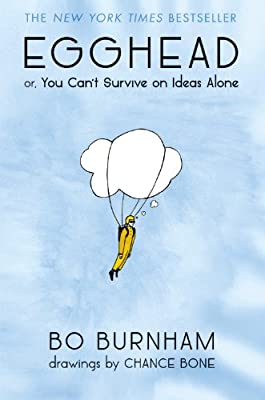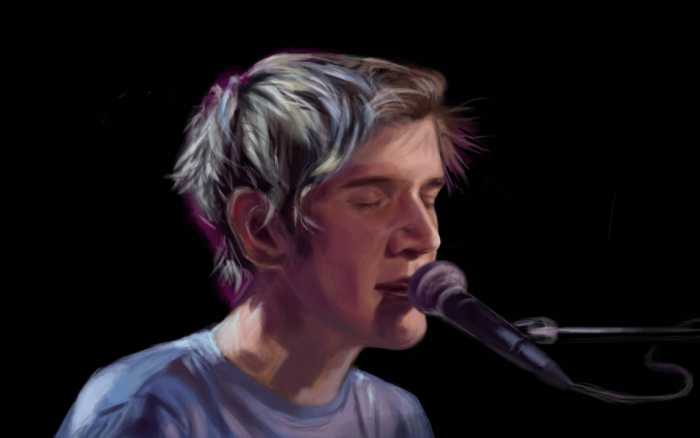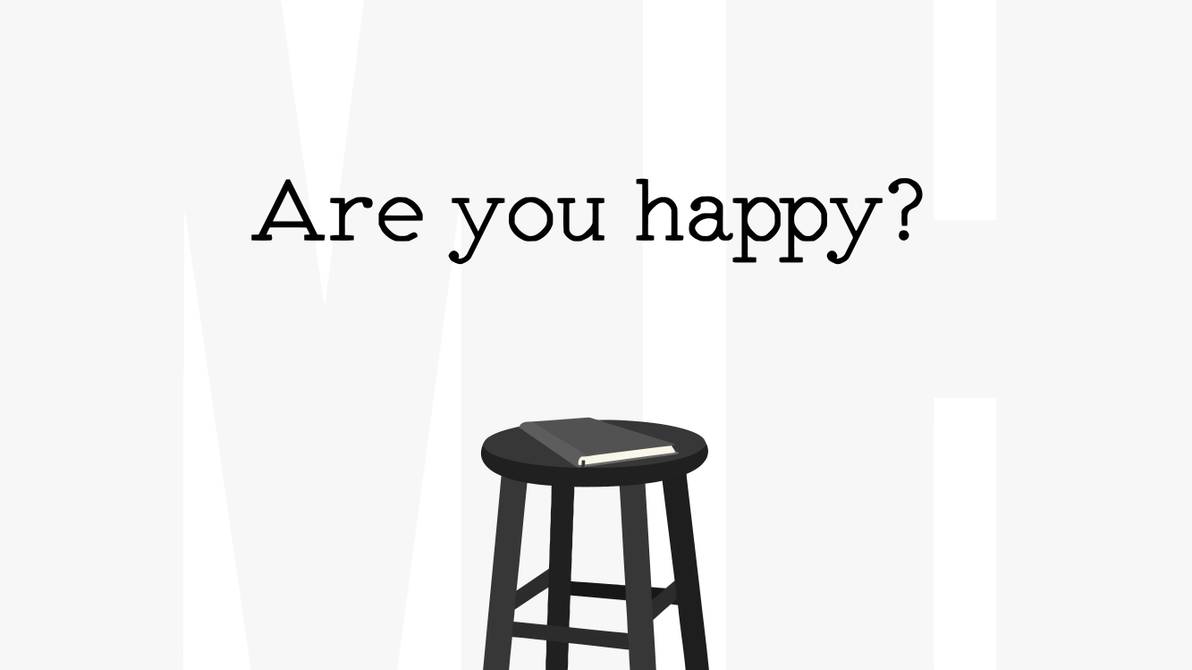Bo Burnham’s Poetry: Not Just a Joke

When comedian and musician Bo Burnham released his poetry collection Egghead: or, You Can’t Survive on Ideas Alone 1 in 2013, it was enthusiastically well received. The New York Times Bestseller has been praised for its unique sense of humour and youthfulness. The book contains a multitude of short poems accompanied by the illustrations of Chance Bone. The poems and drawings both demonstrate a provocative sense of humour.
Burnham has found success through his YouTube channel, stand-up comedy specials on Netflix and YouTube, a brief Vine career, and most recently, directing his own film. Years after publishing, this book is, arguably, one of his lesser-known creations. However, like most of Burnham’s art, Egghead is creative, original, witty, and as this article will go on to argue, far wiser than it appears on the surface. A simple google search reveals that Burnham’s book falls under the categories of “joke” and “humour.” However, this does not offer the depth that is needed to adequately describe this collection.
Modern, short-form poetry is undoubtedly harshly judged and dismissed in literary scholarship (and on the Internet). But in Bo Burnham’s case, his writing is more profound than it might first appear. In viewing this collection of poems as one continuous work, the reader can discern several statements made by Burnham throughout the book.
There are poems in Burnham’s collection that merely intend to make the reader laugh, such as, ‘A Dog’s Poem.’ Narrated from the colour-blind perspective of a dog, it reads:
“Roses are grey,
violets are a different shade of grey,
let’s go chase cars!”
Burnham, Bo. ‘A Dog’s Poem’. Egghead: or, You Can’t Survive on Ideas Alone.
This piece is certainly clever in that it subverts the done-to-death ‘roses are red / violets are blue’ poem template. However, poems such as these do not make any meaningful statement (though, perhaps someone else may interpret this differently). The funny poems should not be dismissed though, they are enjoyable and amusing to read. Listening to the author read his poems aloud offers insight into the sarcastic and often sardonic inflection applied to his work. It is clear that Burnham did not intend this book to be taken too seriously.
That being said, Bo Burnham juxtaposes an often childish and inappropriate sense of humour with ideas that are important, intelligent, and serious. Amidst the humour, the following themes are prevalent from beginning to end.

Language and Words
Many of the poems in Egghead focus on the theme of words and language. They show the inconsistencies or complexities of the English language. Moreover, the execution of several punchlines rely upon clever wordplay.
Burnham’s observations about the complex nature of the English language are often explicit, such as in the poem ‘Homonyms’:
“Homonyms aren’t fare.
It’s awful. It’s tragic.
I say I’m pulling out my hare
and they think I’m talking magic.”
Burnham, Bo. ‘Homonyms’. Egghead: or, You Can’t Survive on Ideas Alone.
Comedic, certainly, but this poem is also clever in highlighting barriers to clear expression. This kind of struggle is likely universal amongst English-speakers, having, at some point, stumbled over homonyms. Those who speak English as a first language often have trouble with homonyms. That is, words that have the same spelling or sound the same, but have different meanings. Therefore, it is no surprise that those learning English as a subsequent language also struggle. Burnham is very bright (a homonym!) to have used this language feature to make his point. It is this inherent truthfulness that makes it amusing.
Burnham also demonstrates that it is not merely the basic rules of the language that are confusing. The manner in which we have adapted the English language to suit our own jargon, and the way we accept that without a second thought, is also perplexing when given deeper thought. He expresses this idea in the poem, ‘Hold the Cheese’:
“I’ll have a cheeseburger.
Hold the cheese.
Hold it in your hand until it melts—
until it bears the shape of that voluptuous palm of yours.
Then put it on my burger.”
Burnham, Bo. ‘Hold the Cheese’. Egghead: or, You Can’t Survive on Ideas Alone.
A typically North American expression, in the food service industry, ‘Hold the X’ means to leave that particular ingredient off the order. Out of context though, as this poem humorously demonstrates, this is a truly odd expression. These ideas are not profound or life changing. But, they do provoke a thoughtfulness in the reader. They show that Burnham’s poetry book is not just a collection of meaningless jokes. This humour is well thought out.
In addition to this, his descriptions of the palm appear romanticised. It is rich with imagery and description, using words like ‘voluptuous’ to vividly paint a picture. This appears mocking of the often sappy and dramatic language of romantic poetry. Thus, a single, seemingly simple poem of Burnham’s can offer several interpretations.

Burnham’s poem ‘Sully’ carries a tone more serious than those previously discussed. Here, he suggests that verbal communication is often difficult. However, he also suggests that communicating through writing makes this easier. The poem opens with, “Sully suffers from a stutter, / simple syllables will clutter…” and continues to detail the trouble Sully has in speaking. The poem concludes, however, with, “At night, he writes his thoughts instead / and sighs as they steadily rush from his head.”
The poem’s character has a stutter which makes this poem seem specific to him. However, many people would relate to its basic sentiment. Anxiety, shyness and a myriad other reasons make verbal communication a difficult skill. For many, this is often alleviated by, instead, communicating through writing. Some of the best writers are less than impressive conversationalists. Before every interview, for example, Vladimir Nabokov, author of the famous novel Lolita, demanded he receive the questions in writing beforehand. He would then write, rather than speak, his responses. He stated that his reason for this was because, “I write like a distinguished author, and I speak like a child.” This aligns with the idea present in Burnham’s poem. ‘Sully’ shows that the written word is powerful and valuable.
Poetry
As part of Burnham’s exploration of the English language, he also offers a lighthearted critique of poetry. This is ironic, in that this is the medium he is using to make that critique. This is at times simplistic, mocking what it takes to write a ‘serious’ poem, like in ‘Advice’:
“If the poem you’re writing is silly and dumb,
make sure that it rhymes at the end. Bum.”
Burnham, Bo. ‘Advice’. Egghead: or, You Can’t Survive on Ideas Alone.
Poetry is not easy. In its strictest form, poems usually follow specific rhyme schemes and have predetermined structures. Constructing a poem that both rhymes and conveys a powerful message is a difficult skill. Having constructed an entire book of poems, many of which rhyme, Burnham is unlikely to truly believe poetry is this easy to create. There is humour in this irony.
His critique is also occasionally more subtle and sophisticated, like the poem ‘Her Eyes,’ which dismisses and replaces commonly used poetic language:
“Her eyes were like fire.
They weren’t red or anything.
Not particularly warm, either.
They didn’t glow or “appear to glow,”
whatever that means.”
Burnham. Bo. ‘Her Eyes’. Egghead: or, You Can’t Survive on Ideas Alone.
This poem goes on to say that what he enjoys about her eyes is that they are familiar and comforting to look at after a long day, much like a fireplace. Unlike what is described in a lot of poetry, the beauty of her eyes is not due to some remarkable and fallacious appearance which is exaggerated for poetic purpose.
It is important to note that it does not appear as though Burnham is truly disapproving of poetry, or the peculiar way in which we use language. In his Netflix comedy special, Make Happy, Burnham states “I like words. I like poetry.” Rather, this joking critique seems to be more of an awareness. An awareness of the way in which we use and manipulate the meaning of words, and more specifically, how poetry often requires the manipulation of language. Burnham uses this knowledge to benefit the delivery of his comedy.

Relationships
Throughout his poetry collection, Burnham often discusses love, affection, and relationships. These are ambiguously defined, so it is not clear whether the relationships being discussed are romantic or otherwise. Many of his relationship poems are not comedic, they are just honest and open. This ranges from the expression of feelings in a way that seems sweet and youthful, to discussions of the tribulations of the hardship and breakdown of relationships. An example of the former is ‘Perfect’:
“I love you just the way you are
but you don’t see you like I do.
You shouldn’t try so hard to be perfect.
Trust me, perfect should try to be you.”
Burnham, Bo. ‘Perfect’. Egghead: or, You Can’t Survive on Ideas Alone.
This poem, though it does not exude Burnham’s signature sense of humour, fits within the general mood of the collection. It is lighthearted and feels playful. It demonstrates that Egghead has its softer side, it is not merely a collection of abrasive jokes.
Burnham’s discussions of relationships are often more serious. His poem ‘Onion’ deals with issues of vulnerability, and the difficulties associated with being open. After explaining that his former significant other (that is, assuming he is addressing a significant other) “had many layers like an onion. / Wait, no, like an artichoke” he then concludes:
“Be sure to call in a year or so and
tell me whether I was lifting heavy
stones off your bunker door or
plucking petals off your face.”
Burnham, Bo. ‘Onion’. Egghead: or, You Can’t Survive on Ideas Alone.
Again, not marred by humour or mocking, this poem appears genuine in its expression of hurt. Whether Burnham is speaking to a previous relationship, or this is mere fiction, this poem uses creative imagery to eloquently make its point. The layers he describes mirror the layers humans often have, unwilling to peel them back until they have gained trust. The poet seems regretful that his partner (or friend, or other in any relationship) was unable to reveal themselves truly. This poem is not clever for its wordplay; it is, instead, clever in its creative use of poetic imagery.
Burnham further speaks to this theme of relationship anxieties. However, he shifts his perspective to look at himself. He offers readers an insight into his own introspection. This is expressed in his poem, ‘Big’:
“When I was little,
I killed ants with a magnifying glass.
And now I’m big.
And I worry I’m doing the same thing with you.”
Burnham, Bo. ‘Big’. Egghead: or, You Can’t Survive on Ideas Alone.
This poem is clear in expressing the poet’s anxieties towards his relationship. But, there is a juxtaposition created here as poems such as these are placed next to absurdly comedic poems within the book. This is also true of his stand-up comedy acts. Serious sentiments are hidden between jokes that are obvious. This is, perhaps, a way of counteracting the vulnerability present in the expression of such feelings.
Finally, some humour. Burnham’s relationship poems are not all serious and heavy. ‘Right, Left’ is an example. The poem opens with the narrator expressing that when his significant other left, he was left cold and broken. He says that this is partly because:
“your love warmed me
and made me feel whole
and made me feel things I hadn’t before.”
Burnham, Bo. ‘Right, Left’. Egghead: or, You Can’t Survive on Ideas Alone.
The reader feels sorry for the poet. He is devastated by this loss. His readers are, in turn, devastated for him. That is, until they read the following two lines which conclude the poem and that read simply, “and partly because / you left me chopped up in a freezer.” This is unexpected and amusing, albeit rather morbid. After the other poems which are less comedic, the shock of this punchline is, arguably, more effective.
In Burnham’s prolonged discussions of relationships, those both funny and unfunny, he proves that his poetry collection is not merely lighthearted. Not just a joke, the poet uses the medium of poetry to express deeper emotions. However, this is occasionally done so with humour as a buffer.
Identity
Throughout Egghead, Burnham offers several poems which discuss identity and a sense of self. A main idea within this theme of identity is both the joy and importance of being unique. The poem ‘Her’ expresses this idea. It opens by describing a woman in a park, she is balanced on a turtle shell, waving old corn dogs in the air to conduct the wind. This description is absurd. She is very distinctly defying societal norms, Burnham pushes the point that this behaviour is ‘not normal.’ Readers laugh at this fictitious, ‘crazy’ lady in the park. She is the ‘Other’ and we, the collective audience not behaving in this way, are correct to think so. However, Burnham then flips the narrative:
“She hasn’t lost it. She’s found it—
and it’s a disgusting and goofy thing.
If you don’t believe me, have a picnic in the park
and enjoy gagging on your homemade cooking.”
Burnham, Bo. ‘Her’. Egghead: or, You Can’t Survive on Ideas Alone.
It is now the reader who is in the wrong. This woman who is unapologetic in her expression of individualism is portrayed by Burnham as a kind of hero. She is praised for her lack of adherence to societal expectations of behaviour. Instead, those that are having their mundane, yet socially sanctioned, picnics in the park are criticised for their lack of uniqueness.

This poem is goofy and exaggerated, though its basic message is clear. Burnham is suggesting that merely fitting in is not always best, nor does it create happiness. For the comedian’s young audience, this is an important idea to be taught. Only 23 years old at the time of publishing, Burnham would likely have been aware of this kind of identity struggle, especially in adolescence. He stresses that being an individual is necessary.
Other poems express the value of uniqueness, such as the poem ‘You.’ This addresses the idea explicitly and in a praising and sweet manner:
“How, may I ask, did you get so you,
you beautiful true-to-you-doer?
I’ve met many today but can honestly say
that I’ve never met anyone you-er.”
Burnham, Bo. ‘You’. Egghead: or, You Can’t Survive on Ideas Alone.
Individualism is again praised, this time attributed to beauty. With this poem, he does not leave it to reader interpretation, his beliefs are stated plainly on the page. Burnham is explicit in championing a sense of unique identity.
However, Burnham’s exploration of identity approaches the more serious topic of negative self-esteem and body image. Similar to the ideas expressed by Burnham’s song ‘Repeat Stuff,’ the poem ‘Ashley’ criticises popular culture for its contribution to self-esteem problems in young people:
“Little Ashley hung magazine spreads on her wall,
after picking the magazines out in the mall.
Models and actresses, singers and more,
with cleavage and makeup and glamour galore!
All of her heroes were finally nearer.
Her whole room looked perfect–except for the mirror.”
Burnham, Bo. ‘Ashley’. Egghead: or, You Can’t Survive on Ideas Alone.
Accompanied by an illustration which shows the exaggeratedly ‘perfect’ people pictured in magazines, Burnham is scathing in his criticism of these works. He contends that they are designed to cause feelings of discontent amongst those who read them. This is similar to his song ‘Repeat Stuff,’ which suggests that the music industry similarly toys with the emotions of young girls for profit.
This is a serious topic which branches into the area of mental health. He is offering an important and poignant discussion of a very real problem. This poem is not comedic. Burnham approaches this topic with a seriousness that much of his work is missing. Here, he is adding another layer to his assessments of the tribulations of teenage identity.
A final idea in relation to identity, Burnham’s Egghead depicts a sense of existentialism. He questions his own identity, suggesting that his life is fleeting. He tries to make sense of the person he is as one person in a vast universe. The poem ‘Stars’ demonstrates this. He opens by describing the “dancing” stars that the narrator is observing. Unremarkable, they simply exist. He then shifts the narrative focus to himself, concluding:
“As I lay down in bed,
I still can’t conceive
that they’ll carry on gamboling
after I leave.”
Burnham, Bo. ‘Stars’. Egghead: or, You Can’t Survive on Ideas Alone.
Burnham discusses his identity here by expressing that he is an insignificant figure. The universe will continue without him. An uncomfortable thought, this is a deep and poignant example of introspection. Reflecting upon his own identity, these ideas are deeper than self-esteem or individualism. Burnham appears deeply aware of who he is as a person, both within himself and within the world to which he belongs.
Burnham’s discussions of identity, which range from the expression of self to man’s very existence, are purposefully placed within his book. They show that the poet has a deep awareness of humans and their place in the world. Burnham is passionate in his beliefs regarding personal identity. This theme demonstrates that Egghead was not created purely with comedy in mind. The poet uses his poetry to make important statements about the self.
The Human Condition
A final theme identified in Burnham’s poetry is that of the human condition. More specifically, the demands of human existence within capitalist societies, especially The United States.
The poem ‘Nine to Five’ expresses the problematic nature of our often work-driven societies:
“Grooming my cuticles
in an un-roomy cubicle.
The phone rings, duty calls.
Better sell those pharmaceuticals.”
Burnham, Bo. ‘Nine to Five’. Egghead: or, You Can’t Survive on Ideas Alone.
The nine-to-five job is heralded by popular culture as both the mark of adulthood and a symbol for the exhausted and uninspired. Burnham is utilising this trope to express criticism of this kind of work. These workers are bored and disinterested in their jobs. There is no enthusiasm in selling pharmaceuticals, it is a chore. This can be interpreted as an assessment of wider society. A society which participates in a joyless work force to merely make ends meet. By highlighting this aspect of life, Burnham wishes it were not so.

Extending this idea of a working society is the poem, ‘Another Day on the Ant Farm.’ This poem personifies an ant and details its unrewarding work in an ant farm. The ants supposedly tend the land, but to no avail. The poem concludes with the lines “I wonder if an Ant Farm’s / just a place where ants are grown.” This is comedic as that is essentially what an ant farm is. Not a farm in the sense that humans work on farms, they are instead designed to allow ants to be studied ‘naturally.’ However, more than just a clever pun, this could also portray a deeper meaning when related to Burnham’s previous comments on work. Perhaps humans are not supposed to work as hard as they do. The world is just a place where humans are grown, but like the ant in Burnham’s poem, we have decided that working hard is the ‘point’ of living. Unlike many of the ideas in Egghead, this idea is subtle and requires interpretation.
Moving away from work, Burnham discusses the seemingly inherent nature of bigotry within society. This is done so in the poem ‘The Future.’ Here, the poet expresses that in the future, a gay couple will disown their child for falling in love with his clone, believing it to be “unnatural” and “an abomination.” This mirrors the rhetoric of homophobia present today. The poem concludes:
“The son and his clone will run away together,
beside themselves, armed only with love.
They will hide in scrapyards and motel rooms
until the bigotry passes, as it always does.”
Burnham, Bo. ‘The Future’. Egghead: or, You Can’t Survive on Ideas Alone.
The final line is poignant and offers an assessment of society that has proven true. Humans continue to find things to disapprove of until society grows to accept it. This repeats itself with different groups of people and, as Burnham pessimistically highlights, it always will. While the bigotry does pass, it is replaced by something else to be condemned. The perspective of this poem is accusatory and bleak. However, it is uncomfortably truthful.
The United States
Being a citizen of the U.S. it is expected that Burnham’s criticism of his country would be loudest in his poetry. He criticises the U.S. in two ways. The first being the excessively patriotic rhetoric shared by the country. This is evident in the poem, ‘The Commercial.’ In this poem, Burnham highlights the way in which American pride is used by advertisers to persuade consumers to buy:
“And we love America! Hip hip hooray!
Every product made right in the US of A.
So come meet our great big American family.
And be welcomed with a great big American laugh!”
Burnham, Bo. ‘The Commercial’. Egghead: or, You Can’t Survive on Ideas Alone.
This poem is unmistakably sarcastic. It is exaggerated and critical to the point of being laughable. Burnham does not enjoy this kind of rhetoric and he displays the sheer ridiculousness of it plainly on the page. An attack on both consumerism and ill-purposed patriotism, Burnham is passionate in his condemnation of this practice.
The second criticism of the U.S. offered by Burnham relates to those who govern the country. Accompanied by the drawing of a robot, the poem ‘Senator’ implies that U.S. Senators are robots. They have bright eyes “better to light paths with” or broad shoulders “better to carry you with.” These are common phrases used by politicians, intended to be persuasive and gain support. They are often uninspired and insincere, which Burnham appears to believe. So, the poem ends, “Wait, why is your chest beeping? / God bless America!” This solidifies the Senator and robot comparison. More than this, it emphasises that these politicians refuse to acknowledge that they are somehow robotic. Within this poem, without expressly stating so, Burnham depicts the U.S. governing body as evil.
Burnham’s poetry book is undeniably funny. However, by discussing deeply serious topics, such as human nature, he demonstrates that his work is not JUST funny. Burnham’s awareness of humans and their behaviour makes his work insightful and intelligent.

Fan Art for Burnham’s stand-up show ‘Make Happy’.
Burnham’s poetry book is a clear product of its time. Modern humour is often characterised by its covering up of serious thoughts with lighthearted jokes. This is a signature of all of Burnham’s comedy, like his song ‘Can’t Handle This.’ Here, he expresses that he is overworked and depressed and has demanded too much of himself. But, he does so by tacitly comparing himself to an over-filled burrito.
That being established, within Egghead: or, You Can’t Survive on Ideas Alone, the seriousness often gets lost amidst the humour. More than this, the outrageously funny poems are often more memorable than those which are serious. For these reasons, you would be forgiven for taking this collection at mere surface level. However, as with any other Bo Burnham art, this poetry collection proves that he is an insightful and thoughtful creator. Arguably, this makes him a better comedian. Egghead: or, You Can’t Survive on Ideas Alone is a poetry collection that demands to be read more than once. Each read provides a new perspective and solidifies the fact that Bo Burnham’s poetry is more than just a joke.
Works Cited
- Burnham, Bo. Egghead: or, You Can’t Survive on Ideas Alone. New York: Grand Central Publishing. 2013. Print. ↩
What do you think? Leave a comment.











I really like Bo, his humor is always part of something bigger, there’s always an underlying message that leaves you thinking. I also admire his use of language, tone, and intention. He can convey such deep meaning using words you’ll use in a drunken party with your bests friends, and it feels natural, organic.
This is why I enjoy his comedy so much, too. He makes childish jokes but they’re often more than just that. He’s deeply introspective.
His joke-delivery is always spot on, too.
Egghead is the most inappropriate school setting book I have read in a while. Burnham is the master of surprises!
BO IS KING. Egghead is becoming an annual read because it’s so funny yet also heartwarming. I love Bo Burnham and am thoroughly appreciative of his genius.
I could not agree more!
Bo Burnham has some material that will offend the sensitive. But he’s a comic genius at a young age. He is more polished than most experienced comedians.
I was lucky enough to be at one of his performances for like half a decade ago. Bo was brilliant. Sure some things are a little shocking – but that’s why it’s comedy. The audience laughed and cheered from the start. I had never heard of him before although I had heard some of his songs without knowing whose they were.
My 15 year old son who is never positive about anything and went to Edinburgh under sufferance was so excited when he saw Bo Burnham was on and tickets were still available it was quite touching.
Anyway, he has had a great career since and I can’t wait to see what he has in store for us next.
Oh wow! I’m envious, I would love to see him perform (and I don’t think he’s doing much of the comedy stuff anymore).
He’s a really unique artist, I agree. I’m not one to sit down and watch comedy specials, but his are so different, so enjoyable!
I found this “poetry” book disappointing. The ‘deep’ poems are fake deep, like tumblr posts and the jokes are childish and inappropriate. For most of them you have to make up your owning ‘meaning’.
I would argue that the whole point of all poetry is to make your own meaning, though. How each person interprets a poem, and what they take away from that, is highly subjective.
This guy is certainly a wordsmith.
I remember seeing Burnham’s “I’m Bo Yo” on YT ages ago and laughing like a drain. It was clever as hell and laugh-out-loud funny. Well, it was to anyone who appreciates wordplay, wit, and gleeful rudery.
Bo is wonderful. Thanks for covering his work.
I have seen Bo Burnham live. He is sensational! Original, absolutely brilliant! One of the greatest talents I’ve ever seen.
I’m definitely envious that you have seen him live!
I have an almost childlike love for the audiobook of Egghead. It sends me into a giggle loop.
Until recently I was unaware that there was an audio book. I must check it out!
His poetry book contains everything I love about Bo Burnham. Many of the poems were great and clever, though I admit I feel like some may have gone over my head with how quickly I sped through them.
I’m a very big fan of Bo Burnham, I have followed him since his days on YouTube. However, I was disappointed and disheartened by Egghead.
I’m sorry, Bo. I just don’t get it.
That is a shame, in my opinion it is really brilliant and many places. But, I know you aren’t alone in feeling that way. I know a lot of fans who just didn’t enjoy his book.
I have never really explored Bo Burnham’s work, though I’ve heard his film Eighth Grade is excellent. Your article made me curious to take a second look. Glad to see this published!
His humour can be rather crass and vulgar (in writing this article I had to mine through his poetry collection for the least potentially offensive or just off-putting poems). So I would say he’s not for everyone.
But I think he’s a brilliant and thoughtful artist and I recommend watching his comedy specials!
Bo, you piece of talent, I vibe with you
If you step back and take this not as pure poetry, but instead, as an artistic take on the over done and over indulged tropes in real everyday life it, it elevates the collection.
It is cheeky and simplistic, both in good ways.
YES! THIS! I completely agree.
I was a massive Shel Silverstein fan growing up and I am a large Bo Burnham fan now. I feel as though between the artwork and the witty poetry done by Burnham himself was the perfect homage to Silverstein as well as a fun extension of the comedian.
Bo Burnham is an amazing egg.
If you are a poetry fan, you’ll understand what his collection is all about. You’ll see the satire and the real life connections and the reason behind it all. You’ll understand his writing style and appreciate the words and where they appear on the page.
Could not agree more!
He’s a very talented chap. I saw him a few years ago in Dublin and couldn’t believe he was still a teenager, I was jealous!
I hate talented young people, they’re so smug and hateful.
Does Bo Burnham really only have one facial expression? 🙂
His show at the fringe was absolutely terrific. It was amazing to see the guy in person after watching his stuff on YouTube. I saw his show the night before he turned 20.
After reading your article, I rewatched “what” earlier this evening and was pleasantly reminded how precociously funny he is – and how sexually fluid.
I recommend ‘Make Happy’ too. It feels more mature than ‘What’ and yet still intensely witty.
Great work! Bo Burnham is amazing. He is funny and complex. Most of the poems are hilarious, and I absolutely love them, but my favorites were the ones where Burnham touched on some deeper feelings.
I adore Bo Burnham and think his comedy show “what.” is pure genius.
It is! ‘What’ was the first project of Bo’s that I saw and it was enough to get me hooked. ‘Make Happy’ is better in my opinion (which is difficult considering he set the bar so high with ‘What’).
He has an odd sense of humor, and I appreciate that.
For every poem I read that I really enjoyed and liked, there seemed to be a handful that didn’t really work to my liking. Maybe I read it too quickly. Still big fan of his work.
I listened to the audiobook for his collection of poems, which was kind of an odd choice given that some of them are reliant on the drawings accompany them. But I had some audible credits to use and I really really love the way Bo Burnham speaks. Mostly I just enjoyed hearing Bo explain the visual jokes and sounding increasingly frustrated with the audio format as the book went along.
Ah wow! I really want to check out the audiobook now. It sounds great.
I listened to the audiobook too. It was great having Bo read the poems with the tone that they were written. Some of my favourites from his stand up show ‘What’ are in here
I don’t particularly hate randomness but I’m just not a fan. So most of Bo’s art does not connect with me.
Bo Burnham is without a doubt a comical genius. His sense of jokes followed by awkward stages of “Did he just say that?” give a sense of awe to any reader.
Some of his earliest stuff, and the jokes he got away with, leaves me rather awestruck! I agree, comical genius definitely.
It was fun to rediscover someone like Bo who I watched in my teens. Just wikipedia-ed Bo and he’s three months younger than me. That’s the most messed up thing I’ve learned today.
It’s crazy to see how talented he was in his teens. Even as a grown adult I could never match that level of talent.
My first instinct is to compare his poetry to a Shel Silverstein, but with the priorities, humor, and attention span of a very intelligent college-aged young man.
His wordplay is clever and pretty funny, but musically I don’t think he’s that great.
I like him. But… some of his poems gets a chuckle out of me, but more had me either making a frowny face or just underwhelmed.
He’s very good. In a strange way he reminds me a little of Randy Newman.
Love his writing. There were several poems that made me forcefully expel air out of my nostrils.
I have probably watched Bo Burnham’s show what. and his compilation of vines on youtube so many times that I should even be ashamed to admit so.
I really like poetry but this his stuff isn’t my thing.
Bo succeeds in making me feel like an egghead.
There’s an audiobook? I’ll check it rn
I actually saw Bo live and he was superb – one of the best comics I’ve ever seen.
He’s a breathtakingly good wordsmith; shoulders above all the other acts we saw.
He’s incredibly clever, certainly makes me envious!
Bo Burnham is one of the few guys who can say “puzy” and not make me want to slap them.
Haha! Yes, he can be offensive but its obvious he never truly means it, he’s poking fun at it.
This makes me want to buy his book- the mix of comedy and poignancy is so interesting, particularly the ‘little ashley’ piece. He makes it so easy to get a point across with light and easy language.
I recommend it! My copy of Egghead is one of my favourite books in my shelf.
He is such a talented, intelligent, and funny guy and he has an amazing way with words.
Basically Shel Silverstein for adults. And I loved it.
He’s such a talented person with so much to say.
I’ve watched Make Happy like 30 times
This definitely fits modern poetry, though some of these probably are a bit much for children.